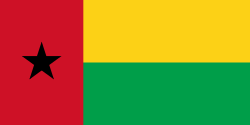
Back Corrupção na Guiné-Bissau Portuguese Corupția în Guineea-Bissau Romanian Corruption in Guinea-Bissau SIMPLE
Corruption in Guinea-Bissau occurs at among the highest levels in the world. In Transparency International's Corruption Perceptions Index for 2024, Guinea-Bissau scored 21 on a scale from 0 ("highly corrupt") to 100 ("very clean"). When ranked by score, Guinea-Bissau ranked 158th among the 180 countries in the Index, where the country ranked first is perceived to have the most honest public sector.[1] From 2019 to 2023, Guinea-Bissau's score had either improved or remained steady every year from its low point in 2018, when it scored 16, but its 2024 score marked a drop of one point from 2023. For comparison with regional scores, the average score among sub-Saharan African countries [Note 1] was 33. The best score in sub-Saharan Africa was 72 and the worst score was 8.[2] For comparison with worldwide scores, the best score was 90 (ranked 1), the average score was 43, and the worst score was 8 (ranked 180).[3] In 2013, Guinea-Bissau scored below the averages for both Africa and West Africa on the Mo Ibrahim Foundation’s Index of African Governance.[4]
The Heritage Foundation stated that corruption is characteristic of the Bissau-Guinean government and economy. Government mismanagement in Guinea-Bissau, according to Transparency International's 2014 report on the country, has "created an environment conducive to corruption on a grand scale." There is a culture of impunity, and citizens have no right to access information.[4]
Much of the corruption in Guinea-Bissau is related to the fact that the country is a hub of international drug trafficking.[5] "Abject poverty, state collapse, lack of means and endemic corruption," states one source, "have made Guinea Bissau a heaven for the Colombian drug lords."[6]
- ^ "The ABCs of the CPI: How the Corruption Perceptions Index is calculated". Transparency.org. 11 February 2025. Retrieved 17 February 2025.
- ^ Banoba, Paul; Mwanyumba, Robert; Kaninda, Samuel (11 February 2025). "CPI 2024 for Sub-Saharan Africa: Weak anti-corruption measures undermine climate action". Transparency.org. Retrieved 17 February 2025.
- ^ "Corruption Perceptions Index 2024: Guinea-Bissau". Transparency.org. Retrieved 17 February 2025.
- ^ a b "OVERVIEW OF CORRUPTION AND ANTI-CORRUPTION IN GUINEA-BISSAU" (PDF). Transparency International.
- ^ "Guinea-Bissau". Freedom House.
- ^ Horta, Loro. "Guinea Bissau: Africa's first narcostate". AFRICAN STUDIES CENTER - UNIVERSITY OF PENNSYLVANIA.
Cite error: There are <ref group=Note> tags on this page, but the references will not show without a {{reflist|group=Note}} template (see the help page).
© MMXXIII Rich X Search. We shall prevail. All rights reserved. Rich X Search
